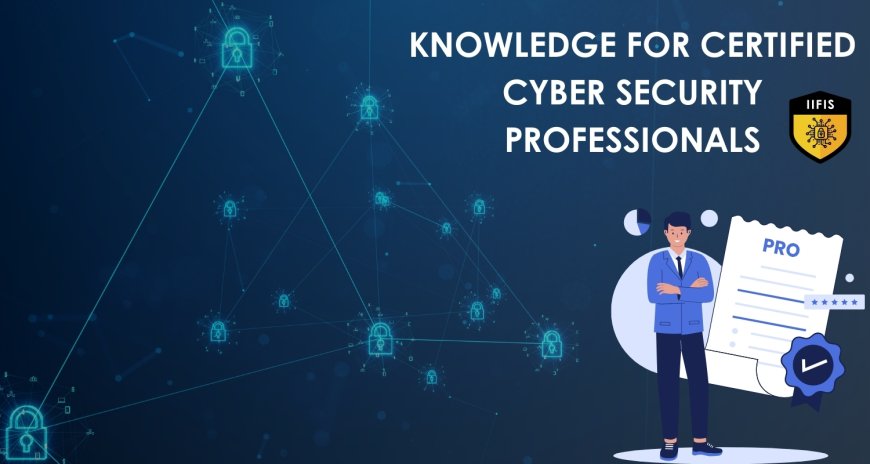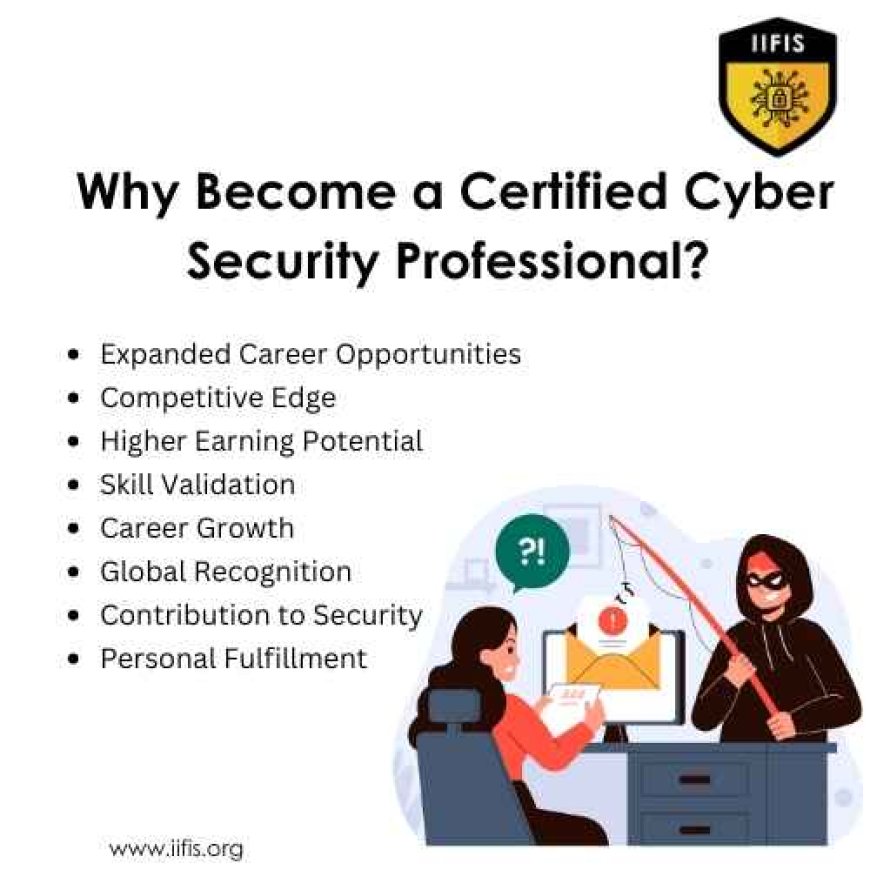Knowledge for Certified Cyber Security Professionals
Discover what it takes to be a certified cyber security pro! Learn important skills, tools, and best practices to succeed in cybersecurity.

Cybersecurity, keeping up means always learning and getting certified. Cyber Security Certifications are super important for people who want to be great at things like keeping information safe, securing networks, and protecting applications. These certifications show that you have the skills and know-how to protect digital stuff in a world full of threats.
There are different kinds of certifications for different levels of expertise and goals. Some examples include the Information Security Foundation and Information Security Professional for general knowledge, and Certified Penetration Tester and Cyber Security Associate for more specialized skills. Each certification teaches you specific things so you can deal with the ever-changing challenges of cybersecurity. One cool thing about these certifications is that they focus on real skills you can use. For example, if you take a Certified Cyber Security Manager course, you'll learn about planning and managing risks, which helps you lead cybersecurity projects well.
Talk about why Cyber Security Certifications are important and look at different programs for both newbies and experienced pros. Whether you want to get better at the technical side or move up in your career, these certifications give you a clear path to becoming a skilled and trusted protector of digital stuff.
The Importance of Knowledge for Certified Cybersecurity Professionals
Keeping our digital stuff safe is super important. Cybersecurity is all about that. It's like having guards for our online stuff. But doing this job well isn't easy. That's where certified cybersecurity professionals come in. They're like the expert guards who keep our online things safe from bad guys. These professionals get special training and certifications to prove they know their stuff. There are different kinds of certifications they can get, like Cyber Security Certifications, Information Security Certifications, and more. These certifications show they're good at what they do.
One big reason we need certified cybersecurity professionals is that online bad guys are always coming up with new tricks. The internet is always changing, so these pros have to keep learning to stay ahead of the bad guys. Having certified cybersecurity professionals gives us peace of mind. When we see that someone has all the right certifications, we know they're serious about keeping our stuff safe. It makes us feel better knowing our info is in good hands.
Certified cybersecurity professionals are like the superheroes of the internet world. They use their knowledge and skills to protect our digital stuff from cyber-attacks. Without them, our online world wouldn't be as safe as it could be.
Understanding Cyber Threats for Certified Cyber Security Professionals
Cyber threats are getting more complicated. These threats include things like viruses and tricks to steal information. It's hard for companies and people to keep up because the bad guys are always finding new ways to attack. This means that experts in cyber security need to always be learning and updating their skills.
Here are some of the big challenges these experts face:
1. Smart Attacks: Bad guys are getting smarter. They're using fancy technology like artificial intelligence to make their attacks better. This makes it tough for normal security measures to stop them. Cybersecurity pros need to keep up with these new tricks.
2. More Targets: With more gadgets and services connected to the internet, there are more ways for bad guys to break in. Every new gadget or service is a potential way for attackers to get in. So, cyber security experts need to check all these places to make sure they're safe.
3. Following Rules: There are lots of rules and laws about keeping data safe. Cyber security pros need to know about all of them and make sure their companies follow them. This can be tricky because the rules keep changing.
4. Not Enough Experts: There aren't enough people who are experts in cyber security. But the need for them is growing fast. This means companies struggle to find and keep the experts they need to stay safe from cyber threats.
5. New Tech, New Problems: There are cool new technologies like artificial intelligence and blockchain that can help with security. But they also bring new challenges. Cyber security pros need to figure out how to use these new technologies safely.
6. Global Attacks: Bad guys can attack from anywhere in the world. This makes it hard to catch them. It's like playing a game of tag where the person chasing you can run anywhere in the world. Cyber security experts need to work together across countries to stop these global attacks.
Cyber threats are always changing, and it's tough for companies to keep up. Certified cybersecurity professionals play a vital role in helping companies stay safe. They need to keep learning, adapt to new challenges, and make sure their companies have strong security measures in place.
What do certified cybersecurity professionals need to know?
Certified cybersecurity professionals should understand a lot about how computers connect, different computer systems, and how to keep them safe. They need to know about things like how networks work, what makes them secure, and how to protect them. It's also important for them to know about computer programs and how they can be used to automate tasks or test for weaknesses. They should know about keeping information safe with things like secret codes and how to make sure a company follows rules about protecting people's information. Alongside all this techie stuff, they also need to be good at talking to people, solving problems, and thinking critically. They need to know a little bit about everything to help keep things safe and running smoothly in the cyber world.

Knowledge for Certified Cybersecurity Professionals
The need for cybersecurity experts is huge. Cyber threats are becoming more common and complicated, so certified cybersecurity professionals need to know the basics well. Let's look at what this knowledge includes.
1. Know About Different Cyber Threats: Certified cybersecurity professionals need to know about various types of cyber attacks like viruses, scams, ransomware, and DDoS attacks. They should also keep up with new threats to protect against them.
2. Learn Security Basics: It's important to understand security basics like encryption, passwords, who can access what, and how to keep networks safe. Knowing these basics helps to set up strong security measures.
3. Understand Laws and Rules: Cybersecurity professionals should know about laws and rules like GDPR, HIPAA, and PCI DSS. This helps organizations follow the law and avoid getting fined or hacked.
4. Manage Risks: They should be good at risk management. This means they need to find out what could go wrong, decide which problems are most serious, and figure out how to fix or avoid them.
5. Respond to Security Incidents: Certified professionals should know what to do if there's a security problem. This includes finding the issue, stopping it from getting worse, fixing it, and getting things back to normal quickly.
6. Build Secure Software: People who work on software need to know how to write it safely. They should be able to find and fix problems that could make the software easy to hack.
7. Design Secure Systems: Cybersecurity pros should know how to set up systems so they're hard to hack. This includes making plans to protect networks, systems, and software from cyber attacks.
8. Keep Up with New Tech: They should stay on top of new technology like cloud computing, smart gadgets, and AI. This way, they can understand how to make them safe from hackers.
Certified cybersecurity professionals need to keep learning to protect our online world. Learning isn't just something they should do because it's their job; it's crucial for keeping digital spaces safe. By always learning, they get the newest tools and tricks to fight against changing cyber threats. Getting certifications and continuing their education helps them stay on top of cybersecurity. Plus, their dedication to learning makes sure they're always ready to adapt to new challenges. Overall, investing in knowledge doesn't just make individuals better at their jobs; it also makes organizations and societies stronger against cyber threats.
























